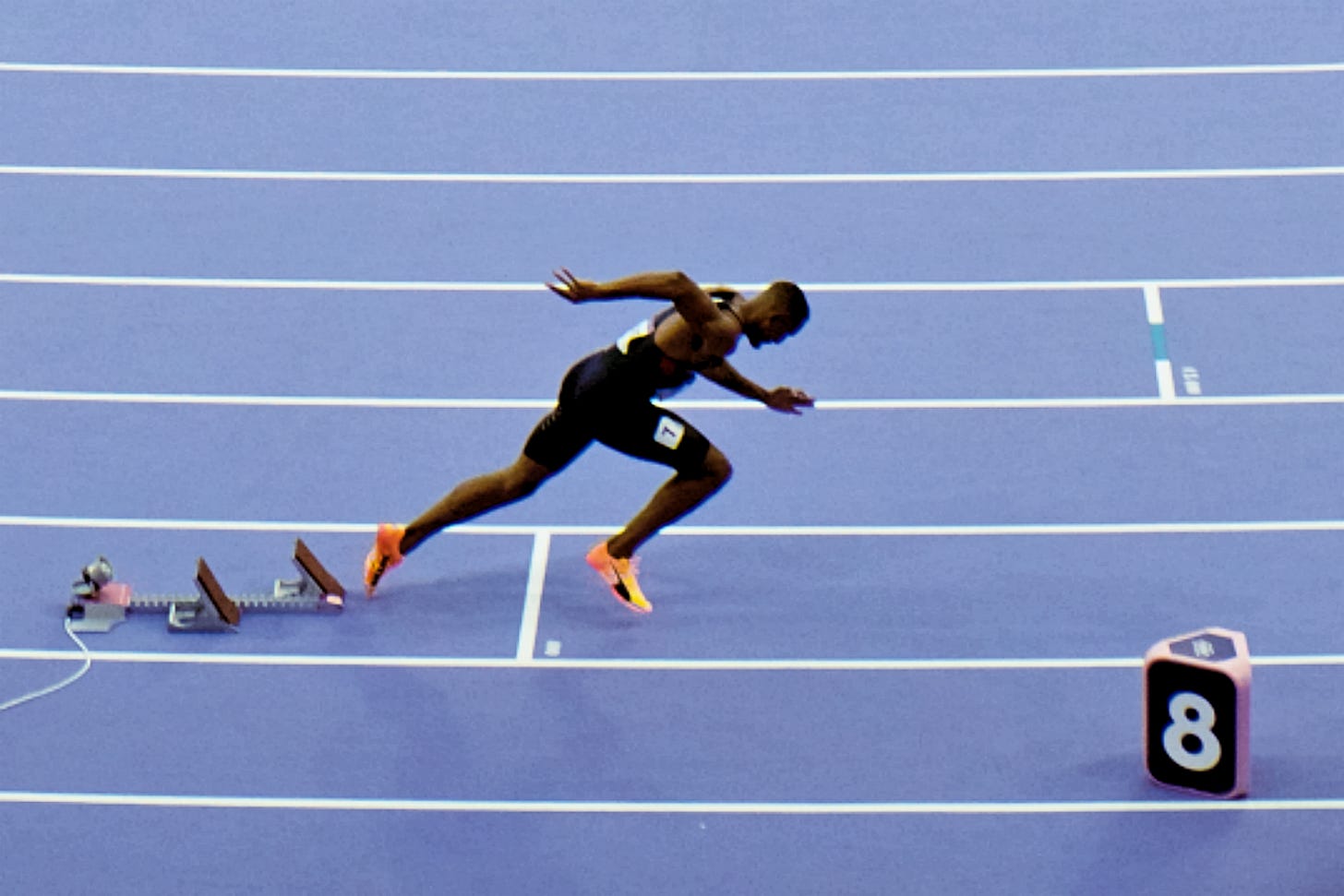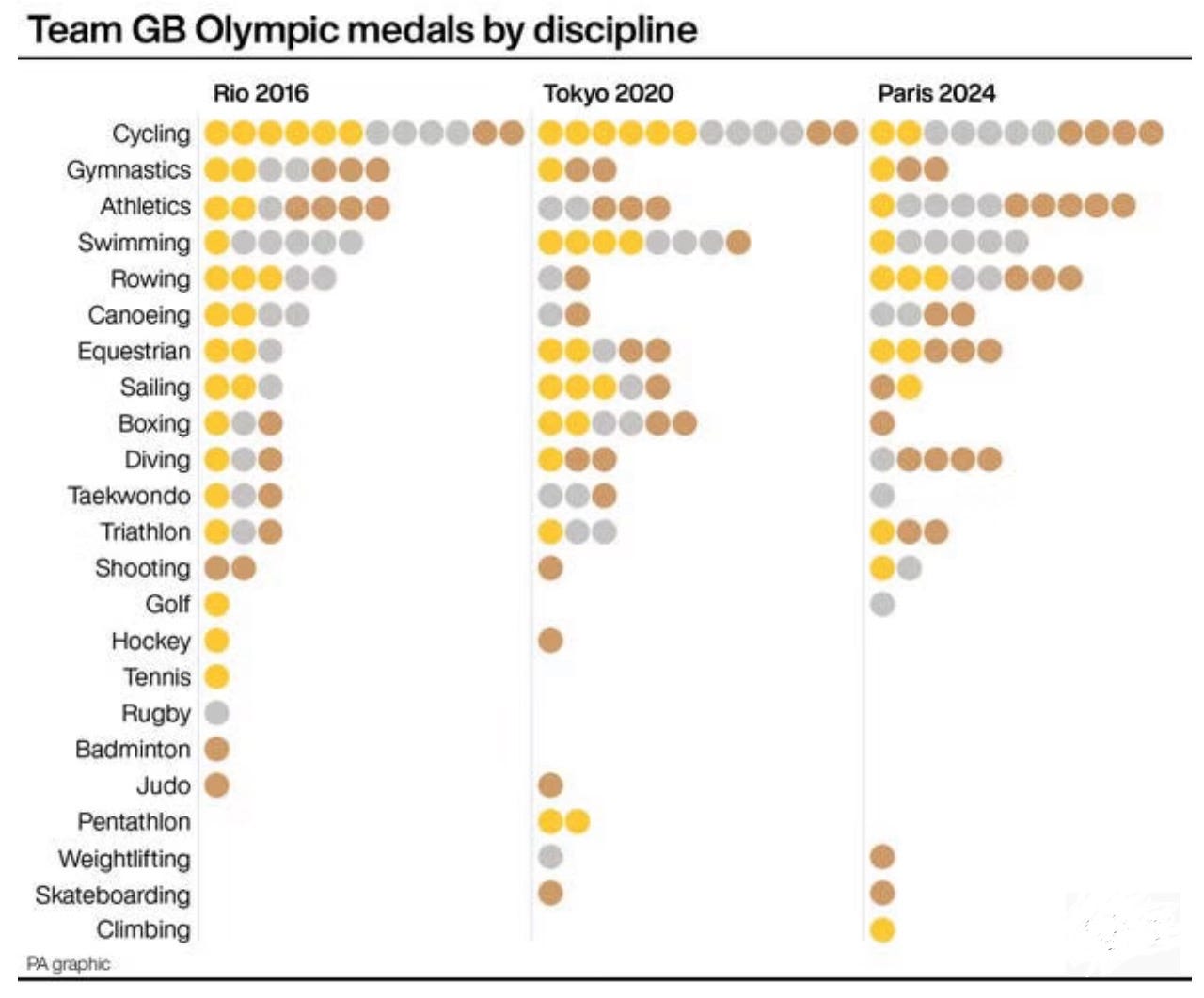Dear Sir Keir, Ms Reeves and Ms Peacock,
How do you feel about Team GB’s medal tally at the Olympics? More medals, 65, than last time out in Tokyo and equal to the London 2012 total. But fewer golds means a slip in the medal table from fourth to seventh. Like me, you probably thought that the analysts at Gracenote and the bookies were too pessimistic when they forecast just such a mix of medal colours. This was truly a silver-gilt Games for Great Britain.
As PM, Chancellor and Sports Minister you have a big decision to take together in the Autumn in deciding the National Lottery and Exchequer funding for the nation’s Olympic and Paralympic sports through to Los Angeles 2028. As a new-broom government you may be tempted to tinker or even tear up the existing funding model that is administered for you by UK Sport. Please resist any such urge. If anything, now is the time to double down on the current strategy.
I hope that none of you took my pre-Games advice to have a bet with your French counterparts about the relative success of our two nations, or you may now be preparing for a dip in the Seine. Apologies if you did. How was President Macron about Paris 2024 when you last saw him? Proud I’m sure of the Olympics themselves which were a triumph, but perhaps a little sore that France’s athletes also fell short of prior gold medal expectations? La Marseillaise rang out just 16 times in the venues. Gracenote had predicted 24 golds for the hosts.
Notwithstanding its current political turmoil, you can be sure that France will now plot to kick on in LA, taking inspiration from Japan. The previous hosts bucked expectations to maintain a third place finish overall with 20 golds against a forecast 13. Now is not the time to lose our national nerve.
Early in these Olympics the British media gently mocked America’s habit of shunning the global standard and following instead a medal table based on total medals rather than golds. In the event, victory for its women’s basketball team against the hosts in the final event of the Games ensured the US matched China for golds and so finished above it in both the official table and the American-preferred version.
Perhaps us Brits should have dialled down the mockery which came during Team GB’s strong start to competition. Britain only won two golds in the final six days, but the silvers and bronzes kept coming to leave us third ranked by total medals won. And it is these second and third places - plus the string of fourths and the broad spread of sports that won medals - that creates the platform for success in four years time.
Olympic and Paralympic funding is a portfolio game. From Games to Games sports wax and wane - witness the resurgence of British rowing and the biggest athletics medal haul since the Olympics were last in Los Angeles back in 1984. Both sports had fallen short of hopes three years ago. Also, medals appear in possibly unexpected places. Just look at the stirring sport climbing gold and the (mainly self-funded) artistic swimmers winning silver.
At Rio 2016 one former leader of UK Sport riled me by suggesting they might only fund Britain’s relay teams and heptathletes in future. Thank goodness such narrow-mindedness is a thing of the past, otherwise four of GB’s ten athletics medals in Paris might never have been won.
It would of course be entirely reasonable for you to scrutinise the current funding system and strategy. If you want to get under the bonnet, I suggest you talk to the performance directors within each of the major sports. Perhaps start with Louise Kingsley at British Rowing and Mike Cavendish of British Triathlon, both architects of triumphs in Paris. My guess is any PDs you do meet will tell you that while more funding would not have led to a greater tally of golds, the damaging impact of inflation means that belts are now as tight as they can be, putting LA success at serious risk.
As you know, UK Sport has recently reduced its own overheads through a restructuring programme to ensure it is lean and fit for purpose. Its leadership is much admired by those of us heading up individual sports and its recent cost-cutting reflects an understanding of the increasingly constrained financial position we all find ourselves in. By my reckoning, most leading governing bodies have seen a 25-30% reduction in their funding in real terms between the Tokyo and Paris cycles. Such has been the corrosive effect of inflation on funding that has been flat in nominal terms.
Dame Katherine Grainger is an excellent chair and figurehead for UK Sport. You will no doubt be planning for her succession in due course. I hope you’re already tapping up Team GB member and super-fan Sir Andy Murray for the role.
You might want to ask what it takes, then, to turn silvers into golds? A few readers of Sport inc. have similarly asked why various British athletes were pipped near the post. Those performance directors would probably join me in responding that the more fruitful question is to ask why the victors won rather than why those behind them fell just short. That’s where the real learnings are to be found.
It is too easy to fall into the trap of viewing events through the lens of your own nation. British Cycling has state of the art equipment, true, but it was naïve for commentators to assume its cyclists would therefore simply clean up in the velodrome. You can be sure the governing body’s leaders and its coaches didn’t fall into the same trap. Fourth in the track cycling medal table with a single gold but most medals won by any nation was a microcosm of Team GB as a whole. I certainly wouldn’t bet against a table-topping velodrome outcome for Britain in 2028.
I realise you are currently inundated with requests for spending to compensate for recent years of inflation. I am also aware that you have been settling a number of long-running public sector pay disputes in which inflation has been a key bone of contention. I won’t argue that Britain’s athletes are key workers, but I do believe that they contribute greatly to the public’s emotional well-being whenever the Olympics and Paralympics come around.
A reminder: direct funding for GB’s Summer Olympic and Paralympic governing bodies and their elite athletes totals about £94 million a year
A big chunk of sport funding comes via the Lottery rather than the Exchequer’s tax receipts. Correcting the real decline in resources employed to support Team GB and ParalympicsGB would constitute a mere fraction of a rounding error in the public finances but could make all the difference between golden Games and silver ones in LA. Make that decision swiftly, so providing sports with planning certainty for the 2028 cycle, and you can book your trip to California with genuine medal expectations as well as hope in your hearts.
Meantime, enjoy the Paris 2024 Paralympics in a couple of weeks’ time. You’re guaranteed to be inspired (and have a chance to reflect on the inequality in funding between our Paralympians and Olympians - but that’s a debate for another day). Do pop along to watch the wheelchair rugby. Hope to bump into you there!
Yours sincerely,
Ed
PS: You might want to insist that the British Olympic Association expands its commercial efforts to raise money for GB athletes throughout the four year Olympic cycle, rather than simply supporting them at Games time. You’ll be aware that this is a contentious issue in governing body world. Happy to discuss!
If the cap fits
To Lilleshall National Sports Centre for the last GB Wheelchair Rugby training camp before our team departs for the Paras. On the final evening the twelve squad members were presented with their ParalympicsGB competition vests by Tokyo gold medallists Ayaz Bhuta and Jim Roberts. Plus, in time-honoured rugby fashion, awarded caps - along with their coaches - to mark selection for the Games. First opponent is Australia at 10:30 UK time on 29 August. The tournament runs to 2 September. Tickets still available.
Group think
Thanks to all Sport inc. readers who responded to my request for your personal 2024 Olympics experiences. The common themes were of huge enjoyment and praise for Paris. Opinion pollsters would deem this sample of ardent sports fans to be too biased to be of value, but I’d warrant that if any of you had not enjoyed the Games you’d have been quick to tell me.
Footy filtered
With the new football season underway, you might want to subscribe to the Cultured Football newsletter which each Saturday features five press articles about the sport that curator Paul Grech deems ‘exceptional pieces’. Here’s the link
And if you must have a medal breakdown by sport…
I picked this up from the Sport & Recreation Alliance whose daily email digest included an article in The Independent which featured this graphic from PA. So consider this a fourth hand visual, or an object lesson in recycling.






